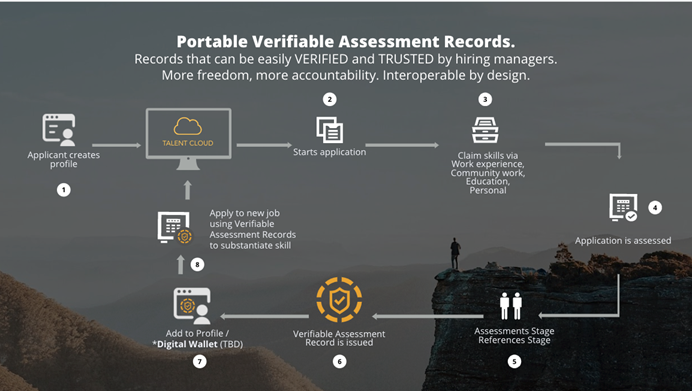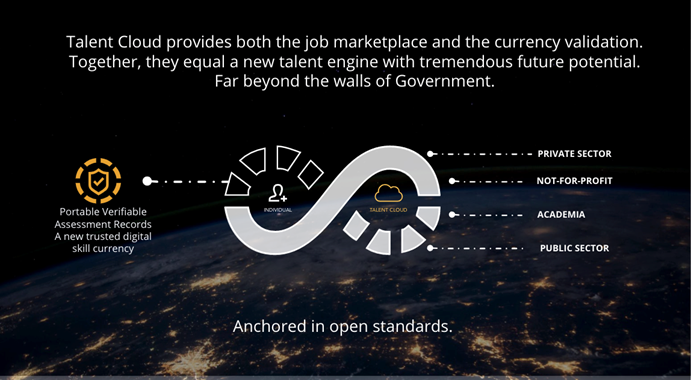Talent Cloud believes, along with many others, that the future of hiring will rely on platforms and processes that use portable verifiable digital credentials. These records allow for reusable, validated information on skills and qualifications to be shared interoperably between platforms. The challenge is, the Government of Canada doesn’t have the technological framework or significant levels of expertise yet in this field. There is a need for a platform that can provide Records as a Service to the Government of Canada - skills records that are interoperable between the multiple HR services and recruitment platforms used by various departments and agencies across government. Positioned in the Office of the Chief Information Officer, and having run several years of experiments in this field, Talent Cloud is well positioned (with the right resources) to provide this service. (Notably, this service is not prescriptive about which staffing platform departments and agencies are using.)
Talent Cloud has been experimenting with the design of portable credentials, blockchain credentials, and micro-reference validation for several years. But to scale this aspect of Talent Cloud work to its full potential would require additional resources, and, ideally, a test case for live pilots at sufficient scale to create the necessary ecosystem behaviours. Talent Cloud would recommend the GC digital community as an excellent potential test case, given that the skills here are heavily in demand, and there are significant efficiencies to be gained from a central repository of digital talent, where skills are searchable and verifiable, and assessments effectively become reusable for mobility and promotion.
In order to understand the power of this new direction in recruitment and mobility, it’s worth taking a look at some background on portable credentials, and how the concept could be used by the Government of Canada.
Portable Credentials are comprehensive digital records issued to a person, by a trusted authoritative source, that contains data that can be accessed and verified by another entity. When designed with open standards and linked data structures, they are interoperable between systems and can be verified in real-time. In a work context, they can offer granular details that can be used for eligibility or where specific skills and qualifications are required to fill a particular role. Portable Credentials provide evidence that a person is qualified to do what they claim and that the qualification is still valid.
There are a lot of different terms used to refer to credentials for the Digital Age. We are using the term “Portable Credentials” as a means to convey the overarching theory but here are some of the other terms you should be aware of: Blockchain, Blockcerts, Open Badges, Verifiable Credentials (VC), Micro-credentials, Learning and Employment Record (LER), Comprehensive Learner Record (CLR).
The three critical elements of Portable Credentials are trust (can be verified), value (can be understood) and interoperability (can be shared).
Because the need is great and the talent ecosystem has changed. People are acquiring knowledge, skills and experience in ways that we could not have imagined when hiring systems were first designed. Yet, the Government of Canada still relies largely on traditional methods and processes to vet talent, particularly when it comes to the recording, storage and non-reusability of assessment information. This asymmetry is causing unnecessary delays in our ability to identify people with in-demand skills and to match talent with work needs. It is also limiting the mobility and professional growth of our workforce.

Now more than ever, it is critical for managers to quickly find and move talent as urgent requirements arise. To do this, applicants and employees need to be able to communicate and share their qualifications and evolving in-demand skills in a way that managers can quickly understand and trust.
Talent Cloud is a contributing founding member of The Open Skills Network, a coalition of more than 40 employers, educational organizations, and technology providers committed to the democratization of skills as a sharable, interoperable currency through the practical application of open, accessible, machine-actionable skills data.
We are witnessing a real-time evolution of the workforce where the skills themselves are becoming a new currency for the labour market. But if skills are going to have value like currency, we have a responsibility to ensure that everyone benefits. This is particularly important for underrepresented groups and individuals in vulnerable situations who are disproportionately affected by restrictive hiring practices. The effects of COVID-19 have had an even greater impact on these groups who could fill critical talent gaps.
Building off of the team’s experience with talent mobility projects and Talent Cloud’s recent Blockchain pilot, three scenarios are ripe for using Portable Credentials for skills. (The following scenarios could be prioritized for the use of Portable Credentials but would require further investment).
When used for skills verification, Portable Credentials can benefit managers by surfacing the granular details and evidence of skill assessments, micro-references and on the job skill demonstration. This allows managers to get quick, comprehensive and contextual information about the skill that was assessed, that can be easily verified.
Applicants and employees can also benefit because the assessment records can be used as a skill signal for managers searching for talent and reused as skill evidence when applying for new jobs. They also maintain greater control over the privacy, discovery, and sharing of their skill data. And because the Portable Credentials are based on open, accessible, machine-actionable skills data, links can be made between in-demand skills and other data sources such as real-time labour market data and career and learning pathways.

The duplication of effort in assessing skills repeatedly is a pain point for people applying for government jobs, for those already employed by the GC and the hiring managers assessing them. Portable Credentials create a way for information to be validated, and allow people to submit reusable, portable data, while maintaining privacy and data ownership. It is important to also note that this model has wide-ranging applications beyond skills verification, such as education records, language proficiency levels, security clearance, etc.
Portable Credentials can generate business efficiencies and improve the validation and auditability of records related to hiring and mobility. It is expected to reduce friction and time to staff for both externally advertised and internal mobility staffing actions, and improve the quality of the experience for departmental HR, managers and employees.
This isn’t in the future 10 years from now. This is an achievable vision with emerging technologies and current open data standards.
However, a skills-based approach for hiring in and of itself is not a panacea. If we want to get it right, we need to acknowledge that this is not just about technology, it’s about people. It’s about moving the dial towards an inclusive skills-based culture where people can be recognized for what they can do.
Talent Cloud cares deeply about creating a more diverse, equitable and inclusive talent marketplace. We believe that skills-based hiring and verifiable skills-based digital credentials can help create such an environment. And that these emerging open technologies and data standards are key to enabling how skills are recognized, shared, and verified across the entire talent ecosystem.
“Talent Cloud is a first-of-its-kind project for the whole world, not just for Canada. It has the potential to inspire and encourage other governments around the globe, through evidence, to follow the trail. It has the potential to show integrity and leadership, that innovation is not just for start-ups, but can be done swiftly and at scale by Government agencies that can fast-track the path to innovation and leave bread-crumbs for a whole country, leading by example.”
Simone Ravaioli
Director Strategic Partnerships, Digitary
Chair, IEEE Integrated Learner Record workgroup
Member of Maintenance Committee, ESCO
Advisor: Open Recognition Alliance, Learning Economy Foundation, International Council on Badges and Credentials
“Today, we have unprecedented opportunities to rebuild how our education, training, and employment systems and processes work together to create valuable career pathways.
We can address the current confusion about the vast diversity of credentials and skills by using a shared data structure, the Credential Transparency Description Language, and digital credentials that people can collect and share. Then government agencies, educators, and employers all have interoperable data to connect people and jobs.
Talent Cloud is a leading initiative in making skills transparent and valuable, and we’re excited to be working with them because everyone deserves the opportunity to understand and apply their talents in meaningful careers.”
Dr. Deborah Everhart
Chief Strategy Officer, Credential Engine
“Portable, interoperable skill credentials enable individuals to find fulfilling jobs and careers while removing traditional barriers that may have excluded them. They will also benefit employers, allowing them to identify provably qualified candidates from a broader pool of candidates.
GC Talent Cloud's work is critical to making this happen. They are working to add a skills dimension to job listings, resulting in more efficient and effective matching of skilled candidates, instead of relying on (often) outdated, overly-broad gatekeeping job requirements.
This opens up opportunities for Individuals with non-traditional educational backgrounds who can be recognized for skills they've learned, whether through continuing education, job experience, or general lifelong learning. And individuals can more easily identify opportunities for which they are well-qualified, even when those opportunities are in different sectors.”
Kim Hamilton Duffy
Architect, MIT Digital Credentials Consortium
Co-Chair, W3C Verifiable Credentials for Education Task Force